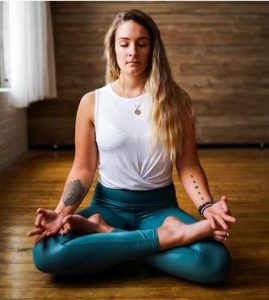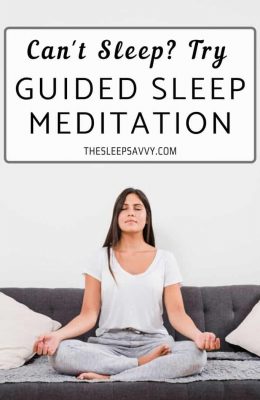We hope you love the product we recommend! Just so you know, at no extra cost to you, we may get a small commission for purchases made through links in this post. Your support is appreciated. Enjoy the read!
Trouble sleeping?
Do you ever get bombarded with annoying thoughts that keep you up at night?
It’s even more frustrating when you’re exhausted but your brain is so active.
It’s sometimes fun to just let your mind go, but it does absolutely nothing to help you go to sleep.
So, what can you do about it?
You can turn to guided sleep meditation!
In Deep Slumber Guide
Yeah, this is not THAT guide!
Playing such an exciting game like World of Warcraft’s “In Deep Slumber” keeps gamers awake long after they should sleeping!
To all the sleep-deprived gamers out there, try out guided meditation and incorporate some of the tips below for a better night’s sleep!
Fully charged, your chances of beating the other guy can be THAT much higher!
Why is Meditation Important
 Meditation has a beneficial effect on sleep because it helps harmonize the body and mind.
Meditation has a beneficial effect on sleep because it helps harmonize the body and mind.
It produces “relaxation response” – a physical and mental state that is conducive for sleeping.
More than just that, it also helps with:
- Better management of stress, anxiety and depression
- Increased immunity
- Lowered blood pressure
- Improved happiness and general well-being
- Longer attention span
- Improved memory
Dr. Herbert Benson, the director of the Benson-Henry Institute for Mind Body Medicine, says that mindfulness meditation is one of the techniques that trigger this state.
He recommends meditating for 20~ minutes before bed to counteract stress, relieve sleep disorders (like insomnia) and enter a zen-like calm.
3 Things to do Before You Meditate
Now, before you try sleep meditation, consider these things first:
1. Solve Physical Problems
- Pain and breathlessness may interfere with sleep, so see your doctor for accurate diagnosis and treatment.
- Avoiding alcohol, caffeine, and other stimulants will make it easier for you to sleep. You may drink coffee or alcohol during the day, but it’s probably best to cut it off after lunch.
- Make your sleeping environment as comfortable as possible.
- Is your bed hard to sleep on? Change it.
- Is it dark enough for you to sleep? Close the blinds and put on a sleep mask.
- The sleeping cycle is affected by the amount of light in the surroundings. This includes the glow of electronic devices, so avoid looking at your gadgets at least 1 hour before bed.
2. Establish Routines
- Establishing a routine will help your brain expect when to sleep and when to wake up.Then, slowly this can turn into a habit where you won’t even need an alarm anymore.
The trick is…to get up as soon as you hear the alarm.
Do not think about how cozy your warm bed is. Yes, I know that’s hard, but just get up and go!
SAVVY TIP: you probably want to put your alarm far away from the bed so you have to get up to turn it off. Also, try setting the alarm tone LOUD and not a tune that you particularly enjoy.
- Avoid prolonged napping – that’s anything longer than 20 minutes.
Why?
You might ruin your sleeping pattern and develop “sleep inertia” that causes tiredness and grogginess.
3. Control Your Thoughts
Your thoughts have a great influence on your emotions and behavior.
This includes your sleep quality.
Watch your internal dialogue to see if it’s preventing you from resting.
- What are your beliefs about sleep?
- Do you accept it or do you think it’s getting in the way of work?
- Do you see it as a challenge that you often fail at?
Drop these unhelpful thoughts and cut out negative self-talk!
Worried about something?
- Write down your worries instead. Beside each, note when and how you can deal with it.
- Taking action is what will make you feel better about these worries, but not right before bed.
- Remember to seek professional help if you experience this for a prolonged period of time.
Anxiety can lead to sleeping disorders!
Guided meditation for sleep
Guided meditation for sleep is a type of meditation practice that involves following the instructions of a guide to help you relax and fall asleep. These guided meditations often use calming imagery and soothing music to help you relax and let go of any racing thoughts or worries that may be keeping you awake.
Here is a simple guided meditation for sleep that you can try:
- Find a comfortable position in your bed, either lying on your back or on your side.
- Close your eyes and take a few deep breaths, focusing on the sensation of the air moving in and out of your body.
- Begin to bring your attention to your body, starting at the top of your head and working your way down to your toes. As you do this, take note of any areas of tension or discomfort, and try to relax those areas.
- As you continue to focus on your body, imagine a warm and soothing light starting at the top of your head and flowing down through your body, filling you with a sense of calm and relaxation.
- When you reach your feet, imagine roots growing from the soles of your feet, deep into the ground. As you feel these roots anchoring you to the earth, allow yourself to sink more deeply into relaxation.
- If any thoughts or worries come into your mind, acknowledge them and let them go, returning your focus to your breath and the sensation of relaxation in your body.
- As you continue to relax and let go, you may begin to feel yourself drifting off to sleep. Allow yourself to fully surrender to sleep, knowing that you are safe and supported.
Remember that the goal of this meditation is not to force yourself to sleep, but rather to relax and let go of any tension or stress that may be preventing you from falling asleep naturally. If you find yourself struggling to sleep despite practicing this meditation, it may be helpful to try other relaxation techniques or to speak with a healthcare professional for additional support.
Christian Guided Meditation
There are meditations that are specifically created for Christians. And who wouldn’t want to be able to celebrate their faith even during their slumber?!
Two of the most popular Sleep Meditation for Christian YouTube channels are:
Guided Bible Sleep Meditation by Abide
This 3 hour meditation not only guides the listener into sleep; it also helps renew faith in Jesus. This is just one of the many Bible-based meditations available from Abide.
Alone With God by DappyTKeys Piano Worship
For those who get distracted by too many words, peaceful music may be a better option.
This YouTube channel from DappyTKeys Piano Worship is filled with 3 hours of instrumental worship music that relaxes you.
It’s actually one of my favorites!
Meditation Sleep Music
There is a LOT of serene music that will put you in a meditative state, and eventually lull you into sleep. Some with soothing imagery as well!
Check out our top picks for meditation sleep-inducing music here:
Yellow Brick Cinema
This music-only YouTube channel showcases tranquil music that relaxes you after a stressful day!
They claim that their soft instrumental music is mixed with binaural beats (Delta and Theta waves) to encourage relaxation and deep sleep.
They said their music is most popular for studying and focusing.
Sleep Easy Relax
Another channel worth checking out. They are based in Australia and made their own original peaceful sleep music.
Again, all soft instrumental music, no voices. Just listen and drift off to deep sleep – just what you needed after a hectic day at the office!
UCLA Guided Meditation
Did you know that UCLA has a meditation podcast, mindfulness app, and a free guided meditation online course?!
Introduction to Mindfulness Meditation (Mini) Course
Recorded by Diana Winston, the Director of Mindfulness Education at UCLA, this meditation course is available in both English and Spanish.
The English version has 8 audio sessions (71 minutes) while the Spanish version only has 4 audio sessions (36 minutes).
Not sure why there is or what the difference is between the two languages, but it’s free!
UCLA Mindful App
This is where you can get access to their mini-course (and their podcast!) right on your phone.
Available for both Android and iOS devices. Download the free app here!
Guided Meditation Podcast
Meditation at the Hammer Podcast
Every Thursday since June 2012, there’s a free, drop-in session for a guided meditation that lasts about 30 minutes.
It’s hosted by Meditation Awareness Research Center (MARC) at UCLA’s Hammer Museum and is recorded and uploaded onto their podcast.
There’s a new theme each week, and the format includes opening comments, guided meditation, silent practice time, then closing comments.
It’s typically led by Diana Winston with some guest leaders.
Sleepy Podcast
You can listen to the host, Otis Gray, read you to sleep in his low (baritone) voice. Anything from old books to poetry to novellas that can put you to bed.
Available on Player FM, Spotify and Apple Podcast, check out his meditatiive podcast for sleep here!
Meditation Vacation by Christian Thomas
A normal guy from the UK, who used guided meditation to get him through a tough stage in his life, and now he’s paying it forward for making his own guided meditation videos to help you sleep.
He has 112,000+ subscribers on YouTube with over 15 million views on his channel collectively, while this particular video has >2 million views on its own!
Guided Meditation for Teens & Kids
Teen angst is a real thing! And they need their sleep even more as they go through puberty.
New Horizon – Meditation & Sleep Stories
This guided meditation is for teenagers who are suffering from stress and anxiety in the form of different stories.
Play this as they are falling asleep and see if it helps them be less moody!
Mindful.org
Here’s a quick and easy 8-minute meditation exercise for your teen.
Why is it important for them to learn how to meditate at such a young age?
Well, because “research suggests [cultivate mindfulness will help them] develop resilience, improve executive function and social and emotional skills that allow them to steer themselves when the time comes.”
Get them in the habit early on, so it’s like second nature to them. This is a life skill that will serve them time and time again.
It’s a way to calm down, relax the mind and stay positive. It reduces anxiety and gives them back their emotional balance.
It’s potentially the second greatest gift you can give them…after giving them the gift of life, of course!
Meditation Vacations
Meditation vacations, also known as meditation retreats, are trips that are specifically designed to allow individuals to focus on mindfulness and meditation practices in a peaceful and serene setting. These retreats can be held at a variety of locations around the world, including remote locations in nature, yoga studios, and dedicated meditation centers.
There are many reasons why people choose to go on meditation vacations. For some, it is an opportunity to take a break from the demands of everyday life and spend time focusing on their own well-being. Others may be looking for a way to reduce stress and improve their overall mental health. Some people may also be interested in learning more about meditation and mindfulness, and a retreat can provide an immersive environment in which to do so.
One of the benefits of attending a meditation retreat is the opportunity to unplug from technology and disconnect from the distractions of daily life. This can allow individuals to focus more fully on their practice and achieve a deeper level of relaxation and mindfulness. Many retreats also offer additional activities, such as yoga, massage, and outdoor adventures, which can further enhance the sense of calm and well-being.
Meditation Locations
There are many popular destinations for meditation vacations around the world. Some people choose to go on retreats in countries with a long history of mindfulness and meditation practices, such as India, Nepal, and Thailand. These countries often offer a range of retreats, from luxury retreats in luxurious resorts to more rustic and traditional retreats in monasteries and temples.
Other popular destinations for meditation retreats include Bali, Costa Rica, and Mexico, which offer a combination of beautiful natural surroundings and access to a range of wellness activities. In the United States, California, Hawaii, and New Mexico are all popular destinations for meditation retreats, offering a range of locations from coastal retreats to desert oases.
Overall, meditation vacations are an increasingly popular way for people to take a break from their daily routines and focus on their own well-being. Whether you are looking to reduce stress, improve your mental health, or simply spend some time in a peaceful and serene setting, a meditation retreat can be a valuable and rewarding experience.
Everyone is different, so this may not work as well for you as it did for me.
If it doesn’t, no harm, no foul.
Go ahead! Give guided sleep meditation try and let me know what you think
>> Wish to know more about air mattress? Figure out our best air mattress here! <<






